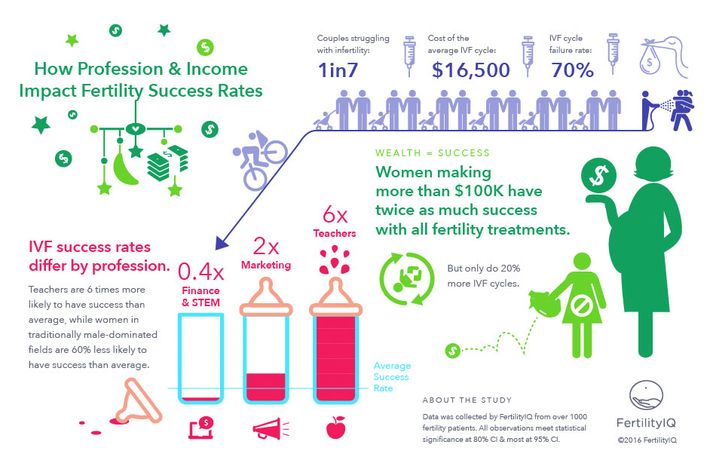
According to a new study, wealthier women have considerably more success with IVF than those who earn less.
The study was conducted by Fertility IQ, a service that helps women on their journey to conceive by connecting them with doctors and data (and collects even more data from those who sign up). Using information from 1,000 women in the United States, it identified some factors that common in women who successfully conceive from IVF.
Women in households making more than $100,000 a year are more than twice as likely to be successful with IVF than their less-well-compensated peers — regardless of age, race, education level, or geography. The same results were essentially duplicated in cases of egg freezing: Women with more money are far more likely to report success.
The study also asked respondents to report what they are paying for IVF treatments, which are prohibitively expensive in the United States. Women reported paying an average of $16,500 per IVF cycle, but women from wealthier households only reported doing more cycles than women with less money about 20 percent of the time, so it’s not simply that they can afford to invest more in the process.

Along with wealth, the study also found that certain occupations make it more likely to conceive via IVF. Teachers, for example, are more than six times more successful than women in other professions. Says the report:
They tell us they feel their work environment puts them in a unique position to succeed: colleagues are happy to talk openly about their fertility experiences, are able to offer suggestions for better doctors and teachers can use the summer months to undergo multiple cycles of treatment.
Women in sales and marketing are also more than twice as likely than women in other professions to be successful in IVF.
In the same vein, women who work in “traditionally male-dominated fields” (like investment banking and engineering) are more than 60 percent less likely to report successfully conceiving. These women, they say, find work to be a hindrance to achieving their fertility goals. They continue:
Patients in these fields comment that they felt the need to keep their treatment a secret from bosses and colleagues and found it harder to begin, and adhere to, a cycle given competing work schedules and pressures.
The study, it’s worth noting, wasn’t conducted using rigorous scientific methods, so it will be interesting to see if its findings are duplicated elsewhere in the future. IVF’s popularity has been growing steadily in the past half-decade — about half of all IVF-born babies (5 million of them) were born in the last five years. But the “average” IVF cycle is about 70 percent likely to fail, according to the CDC, and since they’re so expensive, women have, in recent years, begun traveling to Europe, where one cycle of IVF can cost just $10,000, even when egg donation is needed.




